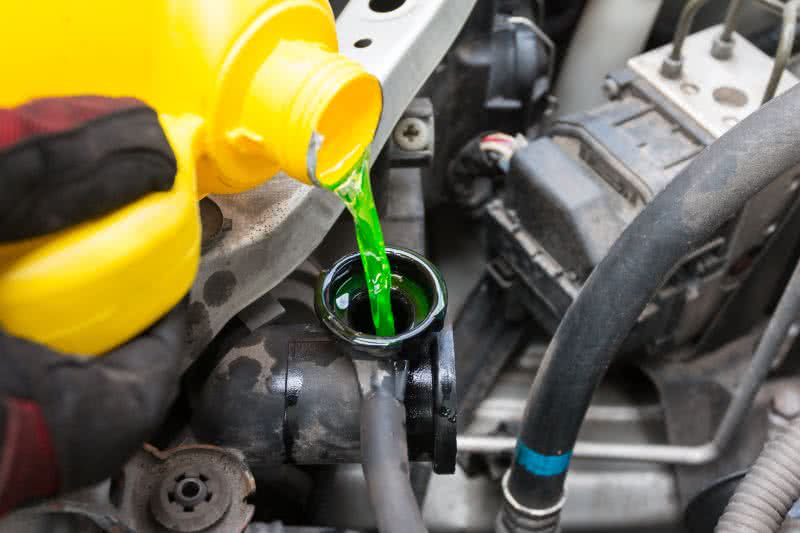An engine’s cooling system is primarily there to eliminate any of the heat which is produced by your engine throughout the combustion process. Without the engine’s cooling system and the necessary coolant, your engine would overheat very fast and several components would be affected by heat damage.
The cooling system’s water pump pushes coolant throughout the engine which then absorbs heat, returning to the radiator, where air moving over the radiator fins lowers the overall temperature of the coolant. Coolant is colourless when made and during the manufacturing process dye is added to help aid customers in selecting the correct product. You’ll find that coolant normally comes in 4 colours: yellow, blue, red, and green or shades of these.

Sign #1 – Why Is My Car Is Running Hotter Than Usual?
If your car’s engine is noticeably hotter, then this can be an indication that it’s time for you to change the engine’s coolant.
To prevent this from happening, check the level of the engine coolant weekly as well as the colour. If you see that there’s rust in the coolant (or it’s brownish in colour) then it’s important that you change it immediately. If you leave rust in your engine’s coolant then it will begin to clog up the system and can cause the engine to heat up very fast; thus overheating.
Sign #2 – Why Is The Coolant Light On?
If your coolant level is dropping lower than it should be then you will be notified by the “low coolant level” light which is normally located on your vehicles dash.
When this light illuminates you should check the level of your engine’s coolant as soon as possible. If you find that the coolant level is lower than it should be, then top it off. When topping it off, make sure that you are using the correct type of coolant and that you are adding an accurate amount, normally indicated by marks on the side of the reservoir.
Due to such a high boiling point coolant isn’t a fluid which normally evaporates. If you have a low coolant level then you will usually find that there may be a problem with the engine or somewhere in the cooling system.
Sign #3 – What Causes A Sweet Smell From My Engine?
When you smell a sweet smell being produced by the car’s engine, this indicates that there is possibly a coolant leak.
Coolant fluid is one of the most important fluids that is put into your car. Some coolants contains a chemical called “ethylene glycol”, something which can produce a sweet-smelling scent when burning off. It’s also a possibility that a radiator hose could be leaking or that the heater core is causing the smell.
If you hear a hissing noise in the engine this can indicate that there’s a leak, so the best move for you at this point would be to turn off the engine and contact a professional as soon as you can. If this noise is ignored then eventually, your engine can be severely damaged and the repair costs will be significantly higher.
Sign #4 – Why Is My Coolant Level Low or Leaking?
If you ever run into an issue with your engine’s temperature then the first thing that you should do is check on the coolant. If the coolant’s level is low then there isn’t enough coolant for the engine to function properly. If that’s the case, low coolant fluid can be a result of:
- Failing to drain the old coolant properly and not replacing it with a sufficient amount of new coolant
- A leak somewhere in the coolant system (common leaks include radiator hoses, damaged bleeder valves, and water pump gaskets)
One thing to keep in mind is that coolants aren’t developed with “anti-evaporation” so if there is less coolant than the amount that you put in, most likely there is a leak.
Coolants are typically a 50/50 mixture of demineralised water and ethylene glycol-based coolant concentrate. The glycol element acts as an antifreeze component and ensures that when the temperature drops, the fluid doesn’t freeze.
Sign #5 – Why Doesn't My Heater Work?
The heating system in a car is somewhat similar to a cooling system.
In the cooling system, coolant fluid is taken throughout the engine and absorbs heat in the process. It then proceeds to force the heat out through the radiator.
In the heating system, a similar function happens. The hot coolant is pumped throughout the engine and is taken through the “heater core”, a smaller radiator. Rather than fanning the heat out of the car, it is pushed through the air vents and into the car itself.
What Is A Coolant Flush?
Coolant needs to be flushed because the additives which they contain begin to break-down over time. Anti-freeze and anti-boiling additives won’t be as effective and this can result in the coolant boiling off.
It’s also important to flush your coolant to avoid any cross-contamination which can reduce the performance properties of your new coolant.
Engines contain a lot of different parts which if aren’t taken care of properly, will begin to rust. Coolant helps prevent rust while it is circulating the engine; this is one of the main reasons why you should change your coolant at its recommended intervals.
That being said, over time particles will be caught in the coolant and it won’t function as it should. By flushing the coolant regularly, you are preventing blockages from occurring and making sure that it performs at an optimal level.
